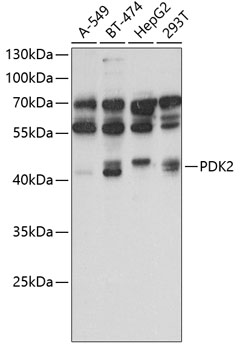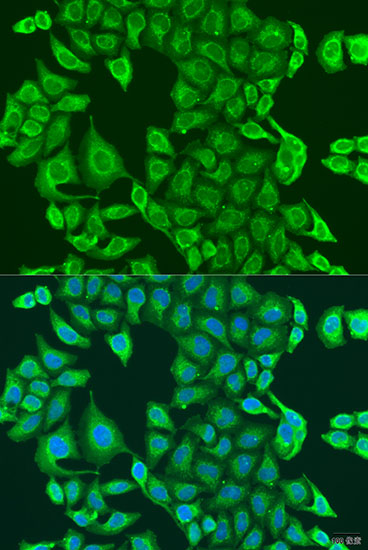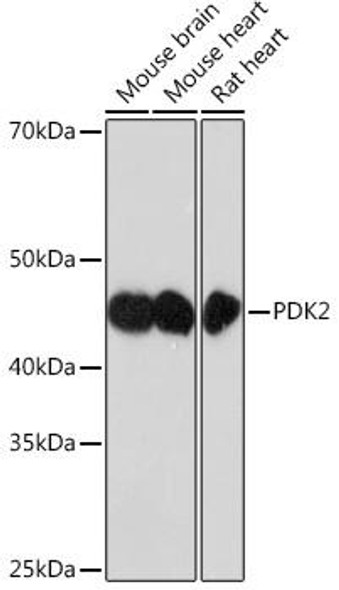Anti-PDK2 Antibody (CAB4012)
- SKU:
- CAB4012
- Product type:
- Antibody
- Reactivity:
- Human
- Host Species:
- Rabbit
- Isotype:
- IgG
- Research Area:
- Metabolism
Frequently bought together:
Description
| Antibody Name: | Anti-PDK2 Antibody |
| Antibody SKU: | CAB4012 |
| Antibody Size: | 20uL, 50uL, 100uL |
| Application: | WB IF |
| Reactivity: | Human |
| Host Species: | Rabbit |
| Immunogen: | Recombinant fusion protein containing a sequence corresponding to amino acids 128-407 of human PDK2 (NP_002602.2). |
| Application: | WB IF |
| Recommended Dilution: | WB 1:500 - 1:2000 IF 1:50 - 1:200 |
| Reactivity: | Human |
| Positive Samples: | A-549, BT-474, HepG2, 293T |
| Immunogen: | Recombinant fusion protein containing a sequence corresponding to amino acids 128-407 of human PDK2 (NP_002602.2). |
| Purification Method: | Affinity purification |
| Storage Buffer: | Store at -20°C. Avoid freeze / thaw cycles. Buffer: PBS with 0.02% sodium azide, 50% glycerol, pH7.3. |
| Isotype: | IgG |
| Sequence: | PTMA QGVL EYKD TYGD DPVS NQNI QYFL DRFY LSRI SIRM LINQ HTLI FDGS TNPA HPKH IGSI DPNC NVSE VVKD AYDM AKLL CDKY YMAS PDLE IQEI NAAN SKQP IHMV YVPS HLYH MLFE LFKN AMRA TVES HESS LILP PIKV MVAL GEED LSIK MSDR GGGV PLRK IERL FSYM YSTA PTPQ PGTG GTPL AGFG YGLP ISRL YAKY FQGD LQLF SMEG FGTD AVIY LKAL STDS VERL PVYN KSAW RHYQ TIQE AGDW CVPS TEPK NTST YRVS |
| Gene ID: | 5164 |
| Uniprot: | Q15119 |
| Cellular Location: | Mitochondrion matrix |
| Calculated MW: | 38kDa/46kDa |
| Observed MW: | 46kDa |
| Synonyms: | PDK2, PDHK2, PDKII |
| Background: | This gene encodes a member of the pyruvate dehydrogenase kinase family. The encoded protein phosphorylates pyruvate dehydrogenase, down-regulating the activity of the mitochondrial pyruvate dehydrogenase complex. Overexpression of this gene may play a role in both cancer and diabetes. Alternatively spliced transcript variants encoding multiple isoforms have been observed for this gene. |
| UniProt Protein Function: | PDHK2: an atypical protein kinase associated with the mitochondrial matrix. The PDHKs play crucial roles in switching metabolic flux from oxidative phosphorylation towards glycolysis. PDHK2 is expressed in all tissues. Contains a HATPase_c catalytic domain, found in several ATP-binding proteins including protein histidine kinases (PHKs), PHDKs, DNA gyrase B, topoisomerases, heat shock proteins, and DNA mismatch repair proteins. PDHK regulates glucose oxidation through inhibitory phosphorylation of the E1 alpha subunit of the mitochondrial pyruvate dehydrogenase complex (PDHC) at any one of 3 inhibitory serine residues. Inhibitory sites 1, 2, and 3 correspond to S293, S300, and S232 in human PDHA1, respectively. Four PDHK isoenzymes have been described, each with different site specificity: all four phosphorylate sites 1 and 2 but at different rates; for site 1 PDHK2 >PDHK4 >PDHK1 >PDHK3; for site 2, PDHK3> PDHK4 > PDHK2 > PDHK1. Only PDHK1 phosphorylates site 3. PDHKs are recruited to the PDHC by binding to a lipoyl group covalently attached to the inner lipoyl domain of the E2 component. PDHA1 deficiency is the most common enzyme defect in patients with primary lactic acidosis. Suppression of PDH by PDHK inhibits the conversion of pyruvate to acetyl-CoA, attenuates mitochondrial respiration, and may contribute to the increased lactate production observed in many tumors. The PDH pathway is repressed in a majority of non-small cell lung carcinomas. Inhibited by AZD7545, dichloroacetate (DCA), and radicicol. Radicicol inhibits kinase activity by binding directly to the ATP-binding pocket of PDHK, similar to HSP90 from the same ATPase/kinase superfamily. |
| UniProt Protein Details: | Protein type:Protein kinase, atypical; Kinase, protein; Mitochondrial; EC 2.7.11.2; ATYPICAL group; PDHK family; PDHK subfamily Chromosomal Location of Human Ortholog: 17q21.33 Cellular Component: cytoplasm; mitochondrial matrix; mitochondrial pyruvate dehydrogenase complex; mitochondrion; nucleoplasm Molecular Function:ATP binding; protein homodimerization activity; protein kinase activity; pyruvate dehydrogenase (acetyl-transferring) kinase activity Biological Process: cellular response to nutrient; glucose homeostasis; insulin receptor signaling pathway; regulation of acetyl-CoA biosynthetic process from pyruvate; regulation of gluconeogenesis; regulation of pH |
| NCBI Summary: | This gene encodes a member of the pyruvate dehydrogenase kinase family. The encoded protein phosphorylates pyruvate dehydrogenase, down-regulating the activity of the mitochondrial pyruvate dehydrogenase complex. Overexpression of this gene may play a role in both cancer and diabetes. Alternatively spliced transcript variants encoding multiple isoforms have been observed for this gene. [provided by RefSeq, Dec 2010] |
| UniProt Code: | Q15119 |
| NCBI GenInfo Identifier: | 21431820 |
| NCBI Gene ID: | 5164 |
| NCBI Accession: | Q15119.2 |
| UniProt Secondary Accession: | Q15119,Q6P515, Q9BS05, A8K3A7, B3KNW0, |
| UniProt Related Accession: | Q15119 |
| Molecular Weight: | 38,864 Da |
| NCBI Full Name: | [Pyruvate dehydrogenase (acetyl-transferring)] kinase isozyme 2, mitochondrial |
| NCBI Synonym Full Names: | pyruvate dehydrogenase kinase 2 |
| NCBI Official Symbol: | PDK2 |
| NCBI Official Synonym Symbols: | PDHK2; PDKII |
| NCBI Protein Information: | pyruvate dehydrogenase kinase, isozyme 2 |
| UniProt Protein Name: | [Pyruvate dehydrogenase (acetyl-transferring)] kinase isozyme 2, mitochondrial |
| UniProt Synonym Protein Names: | Pyruvate dehydrogenase kinase isoform 2; PDH kinase 2; PDKII |
| UniProt Gene Name: | PDK2 |
| UniProt Entry Name: | PDK2_HUMAN |






